#dumouriez
Text
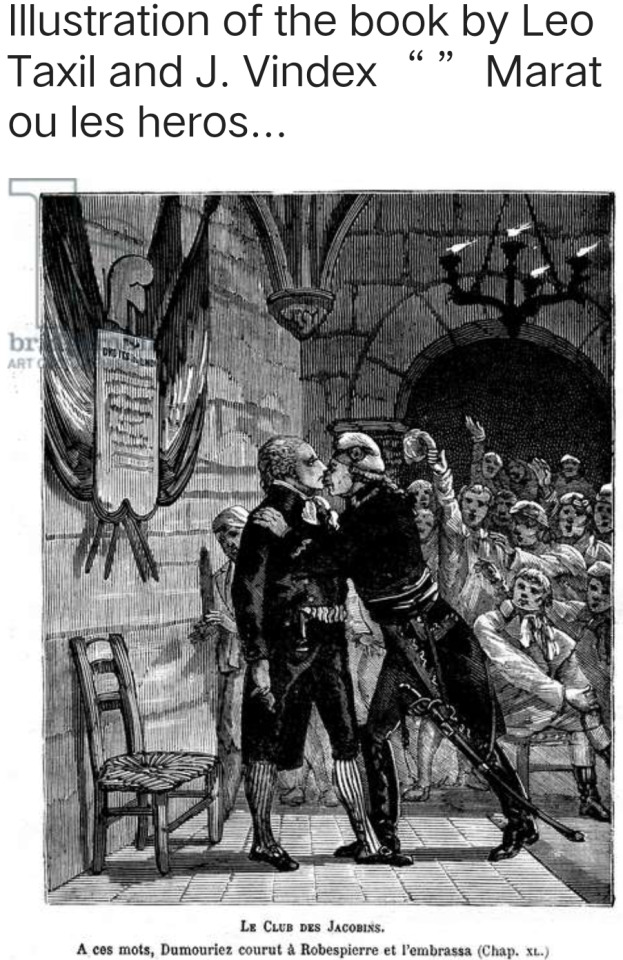
Dumouriez embraced Robespierre, but Robespierre looked a little grumpy and worried. The curve of the mouth, very Robespierre.
71 notes
·
View notes
Text
Awkward hugs compilation
M. Dusaulx: It isn’t envy that rises to this tribune, it is gratitude. I am very attached to M. Petion: he is my fellow patriot. Without ever having spoken to him, I believe I am his interpreter on this tribune. No premature praise: love is the reward of living men, statues and crowns the price of the dead. I regard M. Petion as my son; it is very bold, no doubt!
He steps down from the tribune, and M. Petion throws himself into his arms. This triumph of sentiment made all hearts feel the sweetest sensation.
Session at the Jacobins November 19 1791
M. Dusaulx: All the patriots of this club have long been suspended in the course of a discussion which seemed to compromise two good patriots who must love and esteem each other; something would be missing after what M. Brissot said before leaving this assembly, it is the duty of these two generous men to embrace each other.
No sooner had he finished than MM. Robespierre and Brissot were in each other's arms, amid the unanimous applause of the Society, moved by this touching spectacle.
M. Robespierre: By yielding to M. Dusaulx's invitation, I only gave myself up to the impulse of my heart, I gave what I owed to the confession and to the fraternity and to the feeling depth that I have of a man who enjoys the greatest consideration and who must render the greatest services to the fatherland; I will prove to M. Brissot how much I am attached to him. This should in no way change the opinion that every man should have of the public good; it is to do all that will be in me, and what I believe necessary for the public safety, that I will ask to answer in another session to the speech of M. Brissot.
Brissot and Robespierre at the Jacobins, January 20 1792
M. Dumouriez rushes into M. Robespierre's arms. The Society and the tribunes, regarding these embraces as a presage of the agreement of the ministry with the love of the people, accompany this spectacle with the liveliest applause.
The Jacobin Club, March 19 1792
A few days later Danton came to find me. He showed me a letter that Marat wrote to him; this letter was very insolent; reproaches were mixed with insults; he threatened Danton. Danton seemed angry to me; Marat was on the surveillance committee, we went down there together. The debate was very lively; Danton treated Marat harshly; Marat maintained what he had put forward, ended up saying that it was necessary to forget everything, tore up the letter, embraced Danton, and Danton embraced him back. I attest to these facts which played out before me.
Discours de Jérôme Pétion sur l’accusation intentée contre Maximilien Robespierre (November 5 1792)
Dumouriez enters the hall together with Santerre; the general embraces Robespierre, everyone applauds.
The Jacobin Club, October 14 1792
Rousillon: I was accused of partiality, because I did not want to call into question whether Legendre would be expelled; Momero was said to be an aristocrat; I was forced to embrace Jacques Roux, but never did a kiss seem so bitter to me.
The Jacobin Club, June 28 1793
The reconciliation, however, appeared to be complete; the two embraced: Danton put frankness in it; he was touched; we were all moved: well! How could you not? We only think, we only see the patrie, liberty, the republic; Only Robespierre remained cold like marble!....
Principaux évènemens, pour et contre la Révolution, dont les détails ont été ignorés jusqu’à présent: et prédiction de Danton au Tribunal révolutionnaire, accomplie (1794) by Jean-Lambert Tallien and Jean-Louis-Marie Villain d’Aubigny, page 49-50.
Goupilleau de Fontenay: I challenge David to declare if, at the moment when Robespierre descended from the tribune of the Jacobins, after having delivered his speech, or rather his indictment, he, David, did not go and embrace him saying: "If you drink hemlock, I shall drink it with you."
David: It was not to come and greet Robespierre that I went down to his side; it was to go up to the tribune and ask that the feast of the 10th should take place. I didn't embrace Robespierre, I didn't even touch him, because he repelled everyone.
The Jacobin Club, July 31 1794
On exiting the hall, Tallien doubled his pace, grabbed hold of Fréron, pressed him into his arms and embraced him. This unexpected scene caused great disorder within the club. On one side, people applauded, saying: ”Look! Look! They don’t care!” On the other, one cried: ”This is how the conspirators get along!”
Jacobin Club, September 3 1794, just after both Tallien and Fréron had been struck from the club’s list of members.
Chatillon-Sur-Marne, which I am only mentioning here because Joly, its priest, a former college comrade of Robespierre, got it into his head to come and say hello to him at the time of the terror. Robespierre drew back when he tried to embrace him; and whenever, while talking, the priest of Chatillon-sur-Marne approached the tyrant, the latter huddled in a corner, still afraid of being assassinated.
Dictionnaire néologique des hommes et des choses… (1799) by Beffroy de Reigny, volume 3, page 223
The next day Saint-Just came to my room: I was occupied with my mail and I begged him to let me finish a letter. While I was writing he saw my rifle, seized it and amused himself by examining the battery: it was unfortunately loaded, the shot went off, the bullet passed close to me and went to pierce my coat rack which was on a chair, five or six steps away. I got up immediately, the gun had fallen from the hands of Saint-Just, he turned pale, staggered and threw himself into my arms. He then said to me in a deepened tone: “Ah! Levasseur, if I had killed you? - You would have played me a nasty trick; if I must die from a gunshot, let it at least come from an enemy’s hand. Hearing the report, several officers who were near my door rushed into my room and found Saint-Just, pale as death, in my arms.
Mémoires de R. Levasseur (de la Sarthe) ex-conventionnel, ornés du portrait de l’auteur (1829), volume 2, page 242
The session became so stormy that Collot used acts of violence against Robespierre. He threw himself at him and seized him by the flanks. He was about to throw Robespierre through the window when the latter's friends rescued him. Robespierre then declared that he was leaving the committee, that he could not honorably sit with executioners, that he would report this to the Convention. One saw the danger of publicizing this scene, blamed Collot's patriotic anger, and begged Robespierre, after having torn up the disastrous list, not to give the enemies of the Republic new means of attacking it. Robespierre seemed to calm down, but when Collot approached him to embrace him he refused and despite being urged not to he left.
Mémoires de Barras, membre du Directoire, page 349-350
#frev#robespierre#danton#pétion#brissot#collot d’herbois#dumouriez#fréron#tallien#great occasions for huggning someone:#1 After just having had a political disagreement with the person in question#2 After just having been threatened and insulted by the person in question#3 After just having decided to execute the person in question#4 After just having tried to murder the person in question#frev compilation#also sure david totally believe your version of the story
50 notes
·
View notes
Text
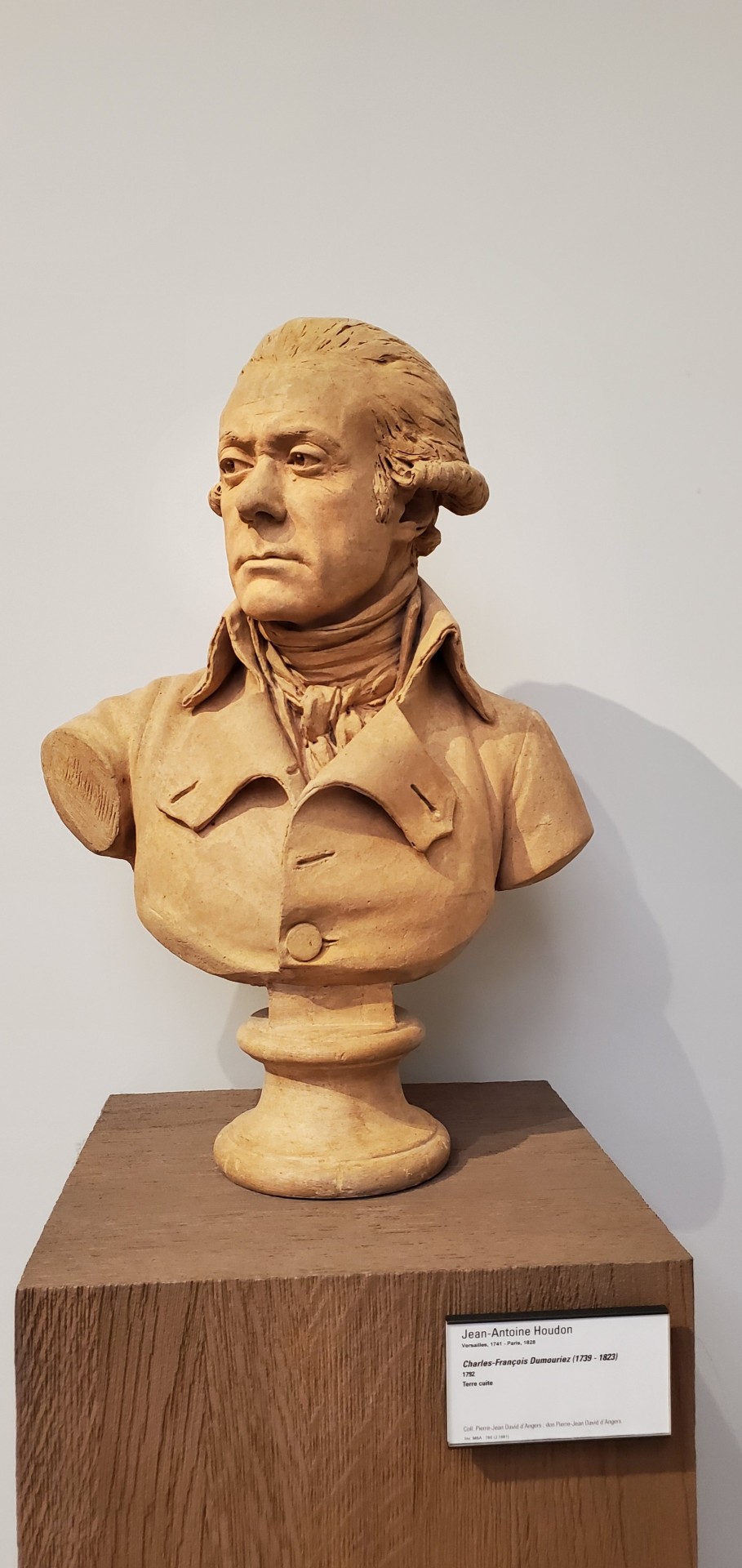

Grumpy Dumouriez by Houdon (Angers' Beaux Arts museum)
12 notes
·
View notes
Text
Pov: you are robespierre
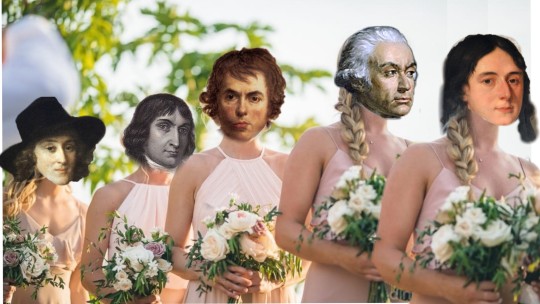
32 notes
·
View notes
Text
"And what shall be the reward of spilling so much blood, one drop of which has more worth than all the crowned heads of the world?"
L’Ami du Peuple, No 634, from Thursday 19th April 1792.
[The very next day, on the 20th April 1792, war was declared against Austria]
If it was still impossible to doubt the traitorous dispositions of the court, after all the plots that it has formed to this day, in order to crush the people, to ruin the nation, and to re-establish despotism, the scene of high scandal that the ministerial cabinet has just been playing out should have sufficed to open the eyes of all.
On the 14th of this month, the ministers presented themselves in the Assembly. The Minister of Foreign affairs [Dumouriez; he took this post on 15th March 1792] took the floor to communicate to them, after the orders of the king, of the dispatches that, he said, were delivered by an extraordinary courier who arrived during the night. He first read out the letter written [by Louis XVI] to sieur [Louis Marie Antoine, Vicomte de] Noailles, ambassador at the court of Vienna, demanding the new king of Hungary [Franz II of the Holy Roman Empire, nephew of Antoinette] to give a categorical response on his attitudes towards France. He then read out the response of sieur Noailles, containing a formal refusal to continue a negotiation that he [Noailles] said was impracticable and an announcement of his [Noailles’s] resignation. He [Dumouriez] proceeded to give a reading of a very pressing dispatch [from Louis XVI] addressed to sieur Noailles. Finally, he [Dumouriez] announced that Louis XVI had just written in his own hand a letter to the king of Hungary, and sieur Molle the field marshal was to deliver it. The response to this letter would arrive on the 10th of next month at the latest and would decide whether peace or war would be. In this epistle, one can clearly sense that Louis XVI is repeating his crude joke of professing his love for the Constitution.
Scarcely had these readings been finished than sieur Briche and sieur Guadet demanded a decree of indictment against sieur Noailles for having disobeyed the orders of the king; they must say so, for he had betrayed the interests of the nation and compromised public safety. After several light debates, this decree was given a near-unanimous pass. Already the ones that did not follow the thread of the story were singing to their victory, for they saw that he was declared a nation-harming (lèse-nation) criminal, he who is an ambassador of France, a close relative (cousin-germain) to sieur Motier [Noailles and Lafayette had the same father-in-law], a member of the Tuileries committee, and a pillar of the Feuillant club; that is to say, one of the main conspirators, bolstered by all the forces of his accomplices, and sure of the support of the vast majority of counter-revolutionary conscript fathers. But their joy was short-lived. Several hours after the decree of indictment, the veil was ripped to lay bare the juggleries of the ministerial cabinet. Sieur Dumouriez appeared on stage to announce to the president a letter that he had allegedly just received from sieur Noailles, who had finally obeyed the orders of Louis XVI and had given news that the king of Hungary refused all negotiations, declaring war on the French nation.
Immediately Thuriot, Goupilleau, Vaublanc, Gentil, Dumas *and the other gangrenous ministers demanded that the decree of indictment be revoked. Sieur Kersaint and Sieur Delacroix ⁑ proposed that the letter of the minister [Dumouriez] and the dispatch of the ambassador be sent back to the diplomatic committee, so that the report would be done on time.
The report done, under the name of the committee, by sieur Lasource, the decree of indictment was adjourned. Such was the conclusion of the ministerial and senatorial farce against sieur Noailles. Thus, by the method of a double correspondence, the perfidious agents of the prince will always get away with their deeds, just like how pirates escape by the method of using false flags. Always the artifices of the court will render the laws illusory; always the apparent acts of justice from the legislator will be none but lures to deceive the people; and no matter how things turn out, always the public enemies at the helm of the vessel of the State will manage to throw it at the reefs, and to direct it in such a way as that shall see it broken by the storm and engulfed by the waves in the end.
So finally here is war declared on the French by the powers plotted against freedom. However, who does not see that all these pretend ministerial negotiations with foreign courts had no other goal than to amuse the nation and to buy time, until all these powers have their batteries loaded, and they are ready to shoot us? Who does not see that all these bellicose preparations, arranged by the Assembly, had no other goal than to lure the nation to sleep in deep dreams of security? Who does not see that all these sending-back to the executive power, the denunciations, the prevaricating ministers, and these complaints of citizen soldiers crammed onto the frontiers and left without munitions, without weapons, without clothes, without pay, had no other goal than to leave the patrie with no means of defence, to leave the State in the grip of the machinations of the court, of the undertakings of the fugitive plotters, of the attacks of the foreign lackeys.
Will there be war? Everybody is saying yes. It is certain that this opinion has finally prevailed in the cabinet, after the representations of sieur Motier who, without doubt, has made it the only way in order to distract the nation from the concerns within to occupy with concerns without, in order to make the nation forget the internal dissensions in favour of news in gazettes, in order to dissipate the national property into military preparations, instead of employing it to liberate the State and to comfort the people, in order to crush the Nation under the feet of taxes, and in order to slit the throats of patriots of the infantry and of the citizen army, leading them to the butcher’s, under the pretext of defending the barriers of the empire.
It is always certain that he pressures the monarch to stop negotiating and to order the campaign to be started, which he regards as a means to honourably end his own career, if he runs out of ways to regain the nation’s confidence with new acts of seduction and of hypocritical devotion to the cause of liberty.
Lost in the heady rhetoric from Brissot, from Lemontey, from Girardin, from Delacroix, from Gouvion, from Dumas and from other scoundrels who have sold themselves to the court, seduced by a false image of national forces, intoxicated by the fumes of Gallic boastfulness, the people seem no less desiring for war than their implacable enemies do. For three years I have represented war as the last resort of counter-revolutionaries and I have not stopped working to thwart the various undertakings of the cabinet to set it aflame. Since then, my attitude has not changed, and in my eyes, war is always the cruellest curse that may be cast on the kingdom. Whatever new focus that war will draw public attention to, by only fixing it onto news in gazettes, war will leave an open field for the enemies within to machinate at their ease and to breathe the fire of civil dissensions into all parts of the kingdom, to instigate troubles, and to set traps for proponents of freedom; the war will completely squander the national property and accelerate public bankruptcy; the war will consummate the loss of everything that France has in good citizens and it will drain the State of all the patriotic youth, because it is the most zealous proponents of the revolution who have been rushing to the defence at the frontiers, and they will always do so.
However fearless they may be, they are without weapons ¹, without discipline, without tactics, without idea of grand manoeuvres ², without the smallest notion of the art of war, without experienced chiefs, without shrewd and faithful generals. How would the soldiers of the patrie resist the attacks from the disciplined armies of lackeys, they who are commanded by shrewd generals?
If war happens, I repeat, regardless of the bravery of the defenders of freedom, it does not take an eagle-eyed genius to foresee that our armies will be crushed in the first campaign.
I can conceive that the second campaign would be less disastrous and that the third could even be a glorious success, since it is impossible that we would not learn at our own expense, impossible that some great man would not be given a position. Yet, to wrest victory from our enemies, we will need to suffer a long and disastrous war. Now, it would fall short of the truth, to say that our losses, over three campaigns, shall round to a billion livres and five hundred thousand combatants.
How shall we compensate for the loss of so many brave soldiers, the flower of the French citizens? And what shall be the reward of spilling so much blood, one drop of which has more worth than all the crowned heads of the world? To prevent this precious blood from being shed, I have proposed for a hundred times an infallible method, which is to take hostage among us Louis XVI, along with his wife, his son, his daughter, his sisters ⁂, and hold them accountable to what happens. A senate faithful to the patrie will speak to him thus: “King of the French, it is in vain that you (vous) hide in the detours of a tortuous policy to see us ensnared in the disasters of war; you have no escape from the avenging power of the people. We declare to you, in the name of the nation, who is your august sovereign, that we do not wish to deal with your fellowmen, the princes of Europe, that we wish to make no preparations at all for war. Whether or not you compromise with them is your choice. The duty to remind your rebellious brothers and cousins is upon you, and so is the duty to divert your fellowmen from all hostile undertakings. The barriers of the State will stay open, yet rest assured that upon certain news that the first corps of enemies shall have crossed them, your culpable head will roll at your feet, and your entire dynasty shall be extinguished in its own blood.”
But a senate faithful to the patrie is even rarer than a patriotic king. How insensible the people is, that they do not sense the necessity to finally choose a supreme dictator, to give him powers that would be circumscribed, so that he would have no authority to dominate, but unlimited authority to cut down the chief conspirators that the public voice has identified, to force the corrupt legislator to put at a price the heads of kings, of princes and of the generals who will come with weapons against us, to offer sums of gold to their troops who will deliver these kings, princes, and generals to us, living or dead, and to receive these troops among children of the State. Soon we shall see their numerous legions, running with weapons and equipment under the flags of freedom, and France shall be delivered from her enemies forever.
The fate that awaits her is less consoling for the friends of the patrie, but the fate that awaits her enemies will be terrible.
At the first shot of the canon fired on the frontier, the departments agree on a plan to reduce the castles and the gardens to ashes and to slit the throats of all public enemies who can be found in cities and in the countryside. As the army will massacre its own perfidious chiefs and conspiratorial generals, and as the entire nation will rise up against its own worthless representatives to seize back the powers that they have stripped from her, the mysterious veil long hung over the intrigues of the cabinets will be torn: however impatient the cabinets are to put the French back into chains, I strongly doubt that Louis XVI shall have the humour to do nothing if he even takes a look at this terrible picture. Let some good man have the courage to put it before his eyes.
---------------------------
Notes in the original:
[1] It is an unchanging fact that sieur de Grave, despite all his civic affectations, has not given a single order to prompt the ministry to arm the national guards of the frontiers since he arrived at the ministry. It is upon their actions, and not upon their talk, that the royal agents must be judged.
[2] It was to prevent the citizen battalions from training for grand manoeuvres that the generals have kept them divided and dispersed into different posts.
Translator's notes:
*This would be Mathieu Dumas (1753 - 1837), a colonel of the general staff of Paris, long lambasted by Marat for refusing to fight, and whose name had come from his father, and not to be confused with Thomas-Alexandre Dumas (1762 - 1806) the Haitian general, whose name had come from his mother, an enslaved and nigh-erased woman.
⁑ This would be Jean-François Delacroix (1753 - 1794) the Dantonist, not to be confused with Charles-François Delacroix (1741 - 1805) the Thermidorian, and father to the painter Eugène Delacroix (1798 - 1863).
⁂ Marat notably did not mention either of the brothers of Louis XVI, because the comte de Provence (future Louis XVIII) emigrated in June 1791 to the Austrian Netherlands, and the comte d’Artois (future Charles X) emigrated even earlier, on 17th July 1789 to Savoy.
I am indebted to @citizen-card for helping me with finding out about the relation between Motier and Noailles, and to @lamarseillasie for making me interested on "just what was Marat's view on dictatorship" in the first place.
36 notes
·
View notes
Text
Propaganda mediatic around Tallien and french revolution
I fully understand that certain figures of the French Revolution are preferred over others who are less liked. It's a matter of preference. I myself have a very cultured friend who is a fan of certain royalists from this period like Olympe de Gouges, although I also admire the character in a certain way and deplore the sexism of that era which excluded her (such as the fact that she totally defends Louis XVI), but I've always enjoyed debating with this person, who is so respectful of others' opinions, very knowledgeable, and well-versed in the subject. Of course, the difficulty lies in not trying to defend the golden legend or the black legend.
It's another thing entirely to invent completely grotesque or even false facts to glorify one figure of the French Revolution and destroy another. In the grotesque episode of "Les Femmes de la Révolution Française" from "Secret d'Histoire," which was actually sexist (I" love" the fact that in this show, which claims to want to glorify women, they talked about the term "demi-mondaine" for women, when will there be an equivalent term for men, or the way paternalistic that someone call Olympe de Gouges the "little" Gouges ), there were also very serious errors or lies, take your pick.
To insinuate that Marat was a dictator when he was simply a deputy who was elected by universal suffrage, a journalist whose recommendations were not heeded, and who was arrested and brought before the Revolutionary Tribunal though acquitted according to the rules, what a funny dictator, I've never seen anything like that from a dictator before.
Furthermore, under what conditions would he have pulled off his coup d'état? The story continues in the next episode, I suppose, even though so far no historian has found any trace of Marat's coup d'état. I imagine the show will clarify that (or not). Under these conditions, I will address Tallien. They try to present him as heroic in the face of Thermidor when in reality everything was prepared for the theater of Thermidor, which was actually more anti-democratic than they let on and not out of the courage of this individual. They say it was Theresia's letter that motivated him to enact Thermidor when in reality it's because Fouché and his gang, of which he was a part, committed the worst atrocities during the French Revolution, and he wanted to escape the punishment that would rightly fall upon him and his friends and try to regain political "purity" by pinning everything on those who were to be executed (he later demanded the head of Billaud Varennes to further absolve himself). There are other motives regarding Thermidor that have nothing to do with the Convention wanting to get rid of a tyrant (Robespierre has faults but not those of a dictator or tyrant) or that they were fed up with the guillotine (the guillotine continued to function after Thermidor and the Convention had voted overwhelmingly for the creation of the Revolutionary Tribunal, arrests, the Law of Suspects). One day I'll write a more detailed piece on what I think because it's very complex, but you can watch "Robespierre: la Terreur et la Vertu" with English subtitles, it gives a better understanding of these events.
Tallien engaged in lucrative business, arresting the richest in Bordeaux so they would hand over all their money to him for personal use. Clearly not an upright man, but very serious. His lucrative business leads me to see two possibilities. Either he plundered honest people in difficult times under the pretext that they were rich and risked ending up with nothing for his personal profit, all while abusing his position, which is generalized extortion. Or he knowingly let suspicious individuals escape in exchange for money (should we recall that some suspicious Frenchmen betrayed France by handing it over to Toulon or Dumouriez), and imposed dechristianization not out of anger like Momoro, for example, but for his political career and to flatter himself, which is worse (sorry for comparing a man like Momoro to an individual like Tallien, they are truly incomparable). Later, he joined the muscadins, among other merry groups.
In any case, it's very serious, and whatever one might say about Robespierre, he had every right to be angry. Tallien is a political turncoat and bloody as Barras (I hate Ridley Scott's Napoleon for destroying the French Revolution and glorifying Barras, among others). The difference between Tallien, Barras, and Fouché is that Tallien completely failed, and an unpopular opinion perhaps, but I'm glad to see he suffered so much; it's well-deserved karma for all the wrong he did.
P.S: I love that the show "Secret d'Histoire" shows Thermidor as a great day for prisoners, as if they don't care about arbitrary arrests after this event (including the arrests of Albertine Marat, Simone Evard, Thuillier found mysteriously hanged, the fact that some political prisoners had to wait a few months after Thermidor to be released).
33 notes
·
View notes
Text
remember when Marat crashed Dumouriez’s fancy high society party in full sans-culotte drip. absolutely iconic.

80 notes
·
View notes
Text
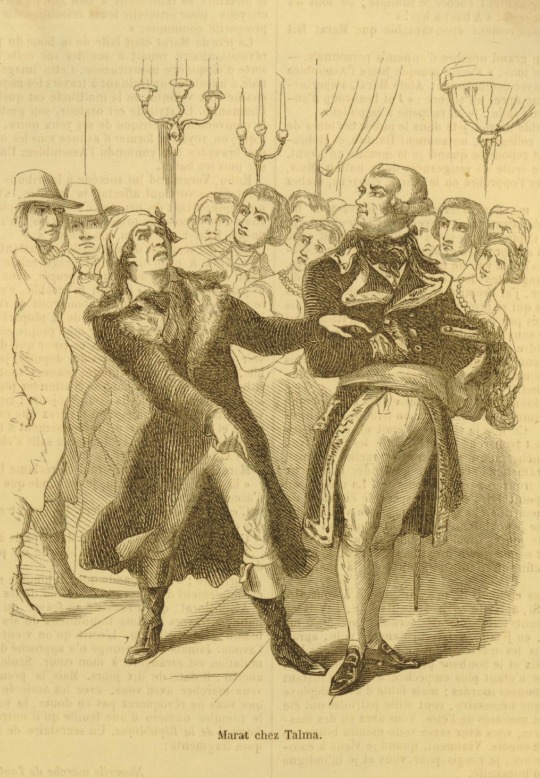
Marat crashing Dumouriez’ party
From Esquiros' Histoire des Montagnards, 1876
30 notes
·
View notes
Note
1, 13, 27!
1. Who is your favourite historical person?
History doesn't play favorites. Should I? (In all seriousness: on a strictly personal level, Saint-Just and Dembowski. Already in the plural. I'd have listed many more.)
13. Something random about some random historical person in a random era.
Before his brief and rather dramatic affair with the French Republican Army, Dumouriez, ever the opportunist, was sent by Choiseul to Poland and took part in the Bar Confederation's military campaign of 1770/1771. He was responsible for constructing new fortifications in a number of strongholds, e.g. Częstochowa and Lanckorona. The latter is where he lost a battle against Suvorov.
27. Favourite historical “ What if… ” ?
What if the gunners and artillerymen of the Paris Commune had managed to overpower Convention forces at the Hôtel de Ville on 9 Thermidor? Would it have led to a prolonged civil war? A military dictatorship of sorts? Victorious or not, would Robespierre and his allies have actually wanted to stage another coup d'état? It's hard to think of an... optimistic scenario.
3 notes
·
View notes
Photo
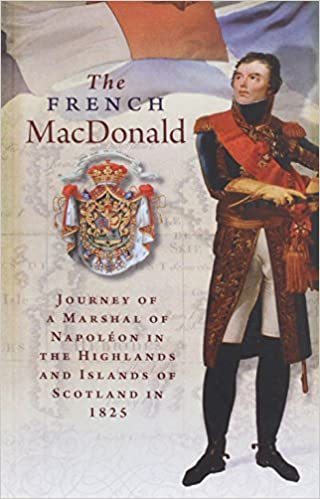


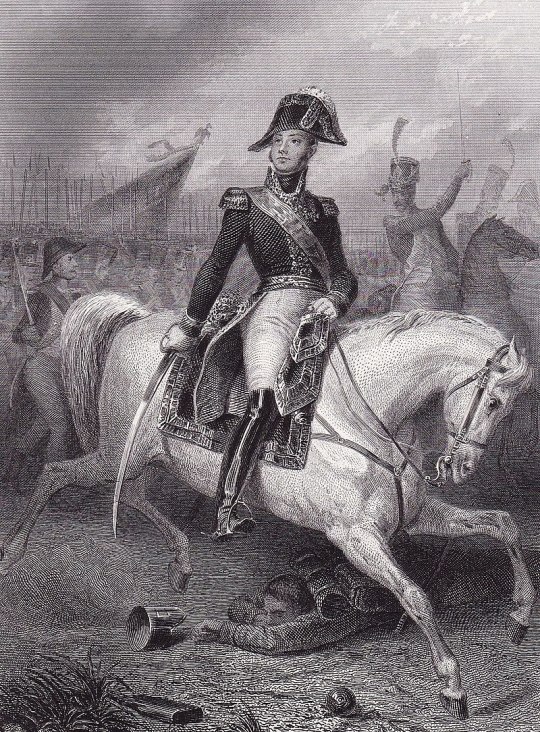

17th November 1765 saw the birth of Étienne Jacques Joseph Alexandre MacDonald at Sedan France.
Scots have had a long history with France, and it did not end with the French Revolution, although no doubt some may very well have become victims of the era and lost their lives and lands, others like Franco-Scot, Étienne MacDonald, would go on to show that their devotion was to France rather than to the ruler.
I’ve posted a few times about MacDonald, but not fully delved into his story, so this is lifted entirely from an article I read. It is a rather long piece, but I found it s very interesting easy read, and shows a man of great dignity. His life covers the French Revolution right through to Napoleon's campaigns through Europe, including his invasion of Russia and his initial abdication in 1814, and beyond.
In 1784 the British Parliament passed the Act of Amnesty which pardoned all Jacobites, but despite this, Étienne’s father Neil MacDonald, who helped Charles Edward Stuart escape to France after the ‘45, never returned to Scotland on account of his poor health and he died in poverty 4 years later.
By this time his son Jacques MacDonald, as he was known, had already begun a promising military career in the French army, and that he would later be central to the cataclysmic events of the French Revolution, Napoleonic Wars and Restoration of the Bourbon Monarchy in France..
MacDonald began his French military career in 1786 by joining the ‘Dillon Regiment’, which was primarily composed of Scottish and Irish Jacobite exiles. The regiment remained loyal to Louis XVI at the outbreak of the revolution in 1789, which led not only to its disbandment in 1791, but the execution of its Colonel, Arthur Dillon, by guillotine in 1794. MacDonald on the other hand was personally loyal to the revolution, marrying a Mademoiselle Jacob, whose father was an enthusiastic supporter of the changes that were taking place in French society.
At the outbreak of war in 1792 MacDonald continued to serve in the new army and was offered a prestigious position as aide-de-camp to General Dumouriez. He distinguished himself at the Battle of Jemappes,and he was also present alongside Dumouriez at the Battle of Valmy. The victory of the French volunteer army at Valmy was a significant turning point in the Revolutionary Wars and it compelled France to formally abolish the monarchy shortly afterwards. By 1793 MacDonald had risen to the rank of Colonel and then refused to desert the Revolutionary Army when Dumouriez defected to the enemy. As a reward for this loyalty he was given the command of a Brigade.
By 1797 he had become a General of a Division and joined the French Army in Italy. He occupied Rome, became the governor of the city, defeated the Austrian Army of General Mack before reorganising the Kingdom of Naples into the Parthenopaean Republic. In 1801 he became the French ambassador to Denmark but did not enjoy the politics of diplomacy and he later asked to be recalled.
After returning to France, it was clear the French Republic was in crisis. Its armies were being outfought by a coalition of empires determined to destroy revolutionary ideas. Internally, France had become politically unstable and a coup d’etat was planned to overthrow the government. It was decided that a general should be part of the coup to ensure the support of the army. The conspirators first choice, General Joubert, was killed in Italy before he could be asked. General Moreau was then asked, but he refused to be a figurehead of the coup. The decision then came to MacDonald himself, and like Moreau before him, he also refused. The next choice for the conspirators was Napoleon Bonaparte, who accepted the offer and took power backed by the army and MacDonald.
Following these events, MacDonald took command of the French Army of Switzerland, an important position that linked the French armies fighting in Germany with those in Northern Italy. He fell out of favour with Napoleon after associating with his rival, General Moreau. This led to Napoleon overlooking MacDonald in his first allocation of Marshals of France around 1805.
The Napoleonic Wars continued from 1805 but MacDonald still remained without a position in the French Army. It wasn’t until 1809 that Napoleon finally allocated command of a Corps to MacDonald, also giving him the responsibility of being a military adviser to Napoleon’s adopted son, Prince Eugene de Beauharnais, the Viceroy of Italy.
The highlight of MacDonald’s career soon followed at the Battle of Wagram in 1809. MacDonald was in command of the reserve corps, and at the height of the battle he was ordered to attack the Austrian centre to relieve pressure on the other parts of the French line. Forming his 8,000 soldiers into an unusual column formation that resembled a large hollow rectangle, MacDonald advanced and successfully held off three Austrian cavalry charges. Under concentrated Austrian cannon and musket fire his Corps suffered 50% casualties and could not advance any further. MacDonald recognised that the Austrians were now disorganised because of his attack, and he ordered the French Guard Cavalry to attack and seize the opportunity to destroy the Austrian centre. General Walther, commander of the Guard Cavalry, refused to take an order from anyone other than Napoleon himself and his cavalry remained stationary. This crucial delay resulted in a lost opportunity to capitalise on the gains that MacDonald had made. Both MacDonald and Napoleon were later furious with General Walther for this decision, Napoleon even being moved to say that it was the first time his cavalry had ever let him down.
Despite the failure of the Guard Cavalry, MacDonald’s attack had sufficiently occupied the attention of the Austrians to allow the French to successfully conduct a general attack on other parts of the line. The French had won the battle and Napoleon rode directly to MacDonald and upon embracing him said,
“General MacDonald, Let us be friends henceforth. You have behaved valiantly and have rendered me the greatest services throughout the entire campaign. On the battlefield of your glory, where I owe you so large a part of yesterday’s success, I make you a Marshal of France. You have long deserved it.”
MacDonald was the first French Marshal to be created on the field of battle and he graciously asked Napoleon to let the rewards be distributed equally among the men of his corps. Napoleon said that he could not refuse him and in further recognition of his services he soon afterwards awarded MacDonald the Grand Eagle of the Legion of Honor, the title of Duke of Taranto and 60,000 francs.
Following the Battle of Wagram, MacDonald was made the Governor of Gratz, a role which he undertook with such distinction that the city wanted to pay him 200,000 Francs when he left, an offer which he refused. MacDonald was then made the Commander of the French army in Catalonia, and also the Governor-General of the principality. MacDonald had serious objections to the manner in which the French were fighting the war in Spain, which had degenerated into a brutal war between French regulars and Spanish guerrilla fighters. Putting aside his objections, he took up the role and met with mixed success. He was defeated at the Battle of Pla in 1811, but later took Figueras after a 4 month siege. Both of these battles were typical of the Spanish War in which large numbers of French troops and resources were tied down by relatively small numbers of elusive Spanish troops. Following the siege of Figueras, MacDonald experienced a sever case of gout, followed by fever. He asked to be transferred and returned to Paris, unable to walk without the assistance of crutches.
MacDonald recovered in time to be present at the French invasion of Russia in 1812, in which he commanded the X Corps and the left wing of the Grand Army. This Corps was a multinational formation, comprising Poles, Bavarians, Westphalians and Prussians. Initially the invasion met with little resistance and MacDonald was able to defend the flank of Napoleon’s invasion by routing a Russian Army near Riga in present day Latvia. Despite his Prussian infantry playing a major part in the victory, MacDonald started to become suspicious of them after they less than enthusiastically undertook his order to pursue and capture the defeated Russians.
After a series of battles Napoleon went on to capture Moscow, which had been completely abandoned by the Russians. After Moscow had been under occupation for three days, the city was set alight by a handful of Russians who had stayed behind to prepare the trap. The resulting fire destroyed 80% of the mostly wooden city and came as a terrible shock to the morale of the French army. Tsar Alexander continued to ignore all calls for surrender from Napoleon and with the French army now camped in a ruined city Napoleon had no choice but to retreat, which the Grand Army began in October 1812.
In November 1812 Napoleon learned that there had been a coup against his rule in Paris. Leaving Marshal Murat in command he left the army had hurried back to Paris to deal with the political problems that had arisen. Marshal Murat also later abandoned the army to save his Kingdom of Naples, leaving Napoleon’s adopted son the Viceroy of Italy, Prince Eugène de Beauharnais in command. MacDonald had previously been a close colleague and military mentor to de Beauharnais and they had worked closely together to secure the French victory at Wagram two years previously.
The French Army had initially invaded Russia with an Army of 450,000 men, but now the remaining 150,000 had the unenviable task of retreating from Moscow through a vicious Russian winter and temperatures of -40c. As the pursuing Russians picked away at the remnants of what was once the largest army in European history, MacDonald was trying to deal with problems within his own Corps. During the retreat he was shocked to discover that General Yorck and the Prussians under his command had defected from MacDonald’s Corps en masse, secretly leaving the army during the night. MacDonald wrote contemptuously of these Prussian’s in his memoirs but he spoke highly of the Polish, Bavarian and Westphalian soldiers of his Corps, who he described as serving faithfully, courageously and with distinction.
During the final stages of the retreat, Marshal Murat requested the advice of MacDonald on how the French Army should proceed. MacDonald recommended abandoning all territory east of the Oder River, holding the line along the river and waiting for the fresh troops being assembled in France. His advice was ignored and the retreat would continue. The total losses during the whole campaign amounted to 380,000 men, with just 35,000 Frenchmen making it home from the initial force.
MacDonald eventually did make it back to France, despite having his travelling expenses of 12,000 francs stolen from him on his way through Prussia. He received a frosty reception from Napoleon when he eventually returned to Paris. The Emperor had been led to believe that the Prussians had deserted the army because MacDonald had treated them badly. In his memoirs MacDonald also suggests that this less than cordial meeting was because Napoleon felt resentment towards his plan of abandoning all territory East of the Oder River. MacDonald left the meeting bemused and with understandable disdain that his services and devotion were met with such a lack of appreciation. However some days later, news had reached Napoleon that the Prussian Government had fully accepted the actions of their soldiers, implying that the desertions had nothing to do with the way MacDonald treated them and everything to do with an imminent Prussian declaration of war against France. He was subsequently summoned by Napoleon, who admitted that he had been misled regarding MacDonald’s actions in Russia, and that he did in fact act wisely in his dealings with the Prussian soldiers of his command.
By 1813 MacDonald was back in the field, joining the 200,000 largely inexperienced soldiers that were sent to link up with the remnants of the French Army in central Europe. A new coalition of powers, including Prussia, had rallied together to defeat Napoleon following his disastrous invasion attempt of Russia.
In the aftermath of the Battle of Leipzig, MacDonald and Prince Poniatowski of Poland were given command of a desperate rear guard action. Hopelessly outnumbered, MacDonald and Poniatowski made a fighting withdrawal through Leipzig towards a bridge across the river Elster. Learning that the bridge had in fact been destroyed by the French in the confusion of the retreat, Poniatowski attempted to swim across the river on horse back. He made it across, but the bank was steep and his horse fell with exhaustion, drowning Poniatowski in the river. As the front disintegrated MacDonald found himself being followed by a crowd of his men desperate to escape the approaching enemy. Seized by his aide-de-camp, MacDonald found a makeshift bridge of wooden logs that had been hastily constructed by a resourceful French engineer. MacDonald dismounted and began walking across the flimsy construction, but as his men began to follow him the bridge began to shake, causing MacDonald to fall into the river. Luckily he fell close enough to the shore that his feet could reach the bottom of the river but he struggled to get out because of the loose soil and steep embankment. Enemy skirmishers fired on him at point blank range before they were scared off by French musket fire on the opposing river bank.
MacDonald barely escaped with his life and upon reaching the top of the riverbank he turned to see whole companies of his men falling into the river, crying out “Marshal! Save your men, save your children!” as they were swept away to their deaths. Overcome with rage and frustration at being unable to save his men, he sat on the riverbank and wept. MacDonald recalls in his memoirs that this scene traumatised him for years after the event and that he could often hear the voices of the screaming men ringing in his ear.
MacDonald was furious with Napoleon for allowing the whole disaster to happen and he initially refused to even meet with the Emperor. Rumors subsequently spread through the army that MacDonald had been killed while crossing the river, but he survived and eventually made his way to Cologne to rebuild his shattered Corps. He remained one of the central commanders of the now hopeless French efforts to keep the allied powers from entering France. Ultimately Paris was captured by the allies in 1814. As Napoleon raced to Fontainebleau it was clear the soldiers were no longer willing to follow Napoleon on what was obviously a lost cause. MacDonald was encouraged to approach Napoleon on behalf of the army, making him aware that the soldiers wanted peace. MacDonald made these points to Napoleon at Fontainebleau, expecting the Emperor to fly into a violent rage, but was surprised when Napoleon reacted quite calmly to the fall of Paris and the reality that the starving and worn out remnants of the army could no longer go on fighting. Napoleon hailed MacDonald as a “good and honorable man” for his frankness and openness. He then turned to all those in the room and announced that he would abdicate the throne in favour of his son. Napoleon sat and wrote out his abdication, rewriting the draft two or three times. Then as Napoleon dismissed them for the evening, he threw himself on the sofa, slapped his leg with his hand and proclaimed, “Nonsense, gentlemen! Let us leave all that alone and march tomorrow, we shall beat them!” No doubt bemused by this departure from reality, MacDonald reiterated everything he had already said about the perilous state of the army. The Marshals, led by Marshal Ney then decided to mutiny against Napoleon to prevent further pointless bloodshed. Napoleon eventually yielded to the inevitable and MacDonald, along with Caulaincourt and Ney, left to personally negotiate the terms of surrender with Tsar Alexander of Russia on behalf of Napoleon.
MacDonald was to write that Tsar Alexander was gracious in victory and spoke respectfully of the French. MacDonald notes in his memoirs that aside from Marshal Ney, who was unstable and aggressive, Tsar Alexander’s conciliatory tone was reciprocated by the French Marshals. The Prussians were far less accommodating and were quick to remind the French that they were the scourge of Europe, immediately demanding compensation and providing none of the compliments that the Tsar had generously offered the French army. The other main member of the allied coalition was Austria, who was willing to allow Napoleon’s wife and son to keep their titles, but on the condition that they were prohibited from ever attaining power in France. Britain refused to negotiate at all, claiming that they did not recognise Napoleon as a legitimate authority, which was probably just as well for Napoleon who half heartedly said that you could “never trust a MacDonald within sound of bagpipes.”
Following the exchange, the allied powers were keen to ensure that the Marshals submitted to the new order. This would guarantee that the French Army would also obediently submit to the provisional government. Marshal Ney immediately submitted, but MacDonald and Caulaincourt remained loyal to Napoleon until the formal ratification of the treaty, after which time MacDonald wrote a simple statement to the provisional government saying that “being released from my allegiance by the abdication of the Emperor Napoleon, I declare that I conform to the Acts of the Senate and the Provisional Government.” This act of dignified defiance infuriated the ever scheming French statesmen de Talleyrand, whose face was said to turn pale before almost bursting with rage when MacDonald politely refused to submit until the formal ratification of the treaty.
MacDonald returned to Fontainbleu to call upon Napoleon. On the morning of the 13th of March 1814, MacDonald entered to find a despondent Napoleon wearing his dressing gown and slippers, with his head buried in his hands and his elbows on his knees. He did not stir when MacDonald entered the room, but on prompting from Caulaincourt he appeared to wake from a dream and MacDonald found him to have a sickly yellow-green complexion. Napoleon apologised and said that he had been sick all night, later evidence suggests that it was likely Napoleon had taken an overdose of opium in an attempt to try and sleep after the emotionally exhaustive events of recent months.
Again, Napoleon sat in the room, remained silent for a period of time before turning to MacDonald and saying,
“Duke of Tarentum, I cannot tell you how touched and grateful I am for your conduct and devotion. I did not know you well; I was prejudiced against you. I have done so much for, and loaded with favours, so many others, who have abandoned and neglected me; and you, who owed me nothing, have remained faithful to me I appreciate your loyalty all too late, and I sincerely regret that I am no longer in a position to express my gratitude to you except by words.”
Napoleon noted that MacDonald had always had a generous manner, never accepting large amounts of money while being an impartial ruler who brought justice wherever he commanded. Napoleon then implored MacDonald to accept the sword of the former leader of the Mamelukes, Murad Bey, which had been captured in Egypt in 1798 and worn by Napoleon at the Battle of Mount Tabor in 1799. MacDonald accepted the gift as a sign of Napoleon’s friendship and the two commanders emotionally embraced each other. It was the last time that MacDonald and Napoleon would ever meet.
I think I’ve taken this as far as I want to for this lengthy post, but there is much more to read in part two just click here!
When he died in 1840 at the age of 70 he was given a state funeral and buried in the Pere Lachaise cemetery in Paris. Pere Lachaise is where the great and good of early nineteenth century Paris were buried. 14 of Napoleon’s 26 Marshals are buried there.
Somhairle MacGill-Eain/ Sorley MacLean, wrote a poem about Marshal Étienne Jacques MacDonald of France, I shall post that later.
There are more pics in the article I took this from here https://sonofskye.wordpress.com/2014/05/10/marshal-etienne-jacques-macdonald-of-france-1765-1814/
52 notes
·
View notes
Text
On this day in Wikipedia: Thursday, 14th March
Welcome, ยินดีต้อนรับ (yin dee dtôn rab), chào mừng, tervetuloa 🤗
What does @Wikipedia say about 14th March through the years 🏛️📜🗓️?

14th March 2022 🗓️ : Death - Scott Hall
Scott Hall, American wrestler (b. 1958)
"Scott Oliver Hall (October 20, 1958 – March 14, 2022) was an American professional wrestler. He was best known for his tenures with World Championship Wrestling (WCW) under both his real name and with the World Wrestling Federation (WWF, now WWE) under the ring name Razor Ramon. Born in St. Mary's..."

Image by Temptintemp1
14th March 2019 🗓️ : Event - Cyclone Idai
Cyclone Idai makes landfall near Beira, Mozambique, causing devastating floods and over 1,000 deaths.
"Intense Tropical Cyclone Idai () was one of the worst tropical cyclones on record to affect Africa and the Southern Hemisphere. The long-lived storm caused catastrophic damage, and a humanitarian crisis in Mozambique, Zimbabwe, and Malawi, leaving more than 1,500 people dead and many more missing...."

Image by MODIS image captured by NASA’s Aqua satellite
14th March 2014 🗓️ : Death - Tony Benn
Tony Benn, English politician, Postmaster General of the United Kingdom (b. 1925)
"Anthony Neil Wedgwood Benn (3 April 1925 – 14 March 2014), known between 1960 and 1963 as The 2nd Viscount Stansgate, was a British Labour Party politician who served as a Cabinet minister in the 1960s and 1970s. He was the Member of Parliament for Bristol South East and Chesterfield for 47 of the..."

Image licensed under CC BY-SA 3.0? by Isujosh
14th March 1974 🗓️ : Birth - Patrick Traverse
Patrick Traverse, Canadian ice hockey player
"Patrick Traverse (born March 14, 1974) is a Canadian former professional ice hockey defenceman. He played 279 games in the National Hockey League (NHL) with five teams...."

Image licensed under CC BY 2.0? by TheAHL
14th March 1923 🗓️ : Event - Charlie Daly
Charlie Daly and three other members of the Irish Republican Army are executed by Irish Free State forces.
"Charlie Daly (10 August 1896 – 14 March 1923), born in Castlemaine, County Kerry, was the second son of Con. W. Daly, of Knockanescoulten, Firies, County Kerry. He went to school, first to Balyfinane National School, and later to the Christian Brothers at Tralee.Daly had been an active member of the..."
14th March 1823 🗓️ : Death - Charles François Dumouriez
Charles François Dumouriez, French general and politician, French Minister of War (b. 1739)
"Charles-François du Périer Dumouriez (French pronunciation: [ʃaʁl fʁɑ̃swa dy peʁje dymuʁje], 26 January 1739 – 14 March 1823) was a French military officer, minister of Foreign Affairs, minister of War in a Girondin cabinet and army general during the French Revolutionary War. Dumouriez is one of..."
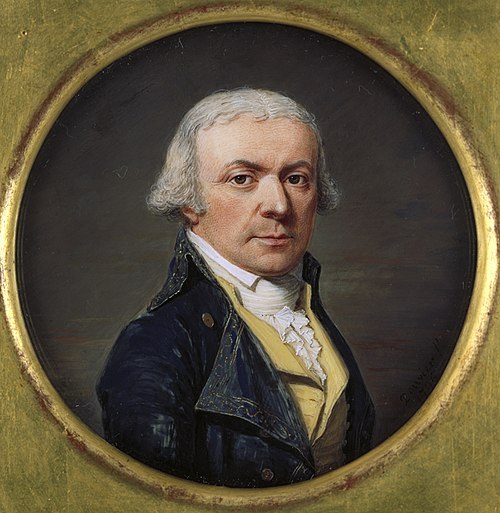
Image by Template:Pierre-Louis Bouvier
14th March 🗓️ : Holiday - Nanakshahi New Year, first day of the month of Chet (Sikhism)
"The Nanakshahi (pronunciation: [naːnakʃaːɦiː]) calendar is a tropical solar calendar used in Sikhism. It is based on the "Barah Maha" (Twelve Months), a composition composed by the Sikh gurus reflecting the changes in nature conveyed in the twelve-month cycle of the year. The year begins with the..."

Image by Raja Ravi Varma
2 notes
·
View notes
Photo
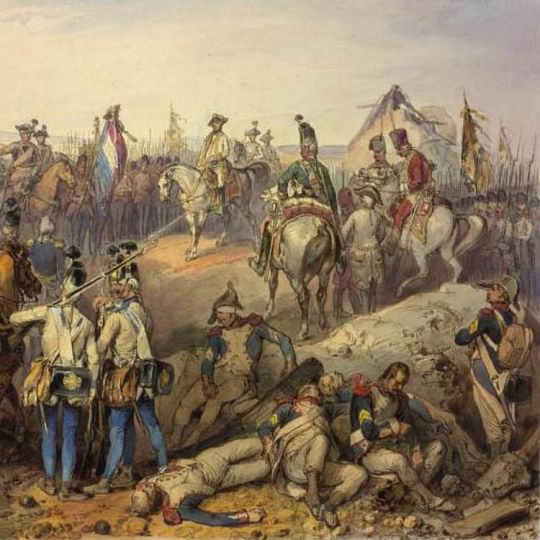
Battle of Neerwinden
The Battle of Neerwinden saw the major defeat of a French republican army by an allied force of Austrians and Dutch during the War of the First Coalition (1792-97), part of the broader French Revolutionary Wars (1792-1802). The battle drove the French from Belgium and led French General Charles-François Dumouriez (1739-1823) to defect to the Austrians.
The War Expands
By the end of 1792, the armies of the young French Republic seemed invincible. Revolutionary France's miraculous victory at the Battle of Valmy on 20 September had turned the tide of the war, halting a Prussian invasion in its tracks, saving the French Revolution (1789-99), and emboldening the revolutionaries to abolish their monarchy. In the following weeks, French armies took the offensive; while one army swept into the Rhineland and occupied the cities of Worms, Frankfurt, and Mainz, another pushed into Savoy and Nice, which were conquered without a single shot fired.
Continue reading...
25 notes
·
View notes
Text
Though I personally think the French Revolution gets a bad rap. The Reign of Terror is, like yeah its obviously bad, but it was overthrown internally and replaced by the Directory pretty quickly, which was much more stable. We don’t normally say “this entire system is bankrupt because at one time it did the bads”, virtually every country had periods like this. Had the French Revolution succeeded and reigned for Forty Years as the First Republic these would simply be the birthing pains that every new order has.
The First Republic *didn’t* reign peacefully for 40 years, however, because the entirety of Europe proceeded to invade France to restore the monarchy. Its complicated for sure, tactically executing Louis XVI was a bad move, yes, but of course a decade of war by a massive coalition undermined the foundations of the nascent republic and resulted in a military dictatorship, no duh. It never actually got a chance to test itself because it faced a situation every single societal reform effort would collapse in the face of for the next century.
There is this idea of the French Revolution Undone By Its Very Essence, of being Ideals Betrayed By the Crowd or somesuch. When really they just blundered on the foreign policy front and had a real first mover disadvantage. The Directory just needed to like listen to Talleyrand more and ignore Dumouriez, had they avoided war in 1792 I think they good odds of looking a lot more like future French Republics (so like falling after 40 years lol, but its a fine enough outcome).
26 notes
·
View notes
Photo

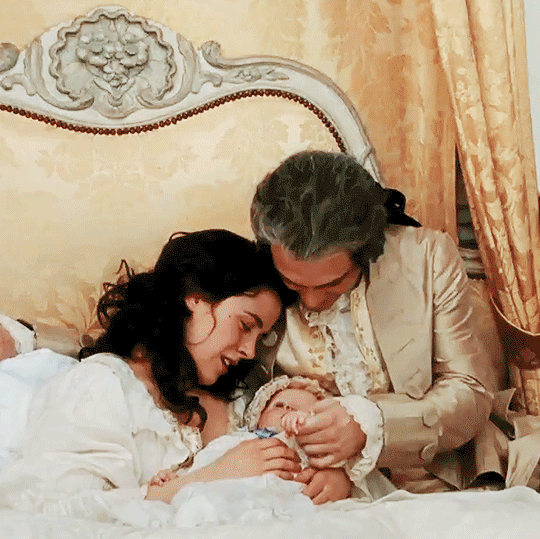
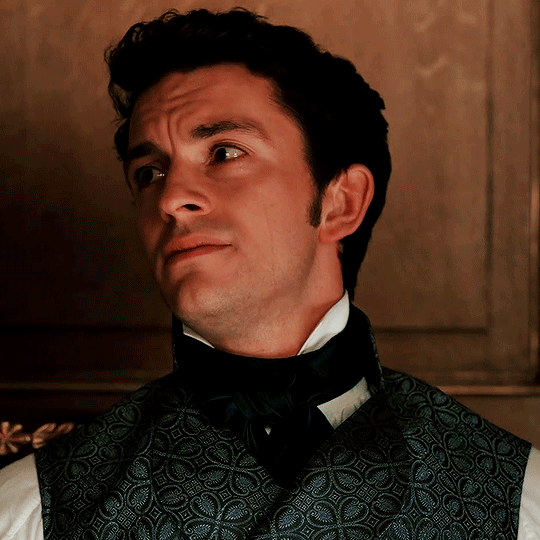
the son of philippe égalité the duc d’orléans, louis philippe, was a general in the french army who joined general dumouriez in a plot to visit the austrians, who were an enemy of france, and the two subsequently deserted the french army. although there was no evidence that convicted égalité himself of treason, the simple relationship that his son had with dumouriez, a traitor in the eyes of the convention, was enough to get him and his two other sons arrested. he spent several months incarcerated, despite renouncing his son and condemning his actions. tried by the revolutionary tribunal on 6 november 1793, égalité was sentenced to death and guillotined that day. louis philippe would learn of the news while alone in exile in switzerland a month later.
#historyedit#perioddramaedit#french history#history#18th century#louis philippe#my edits#my stuff#i don't know if i could even go on living#if i knew that something i did made someone else decide to murder my dad#(and fun fact his two younger brothers who were also imprisoned both developed consumption while in jail)#(and even after they were released would never entirely recover and would both end up dying of the illness)#(that's THREE separate family members dead because of him i'd throw myself off a bridge i really would)#my poor sad son it's so fucked up#someone needs to do smth about his years in exile if only for the drama of it all
21 notes
·
View notes
Photo

Fellas is it gay to take other man’s frail person in your manly arms and kiss him twice
10 notes
·
View notes
Note
Why did Dumouriez defect to Austria??
he wanted to visit italy but had bad understanding of how magnetism worked so he read his compass the wrong way, thought north was south, and went to austrian netherlands instead.
21 notes
·
View notes